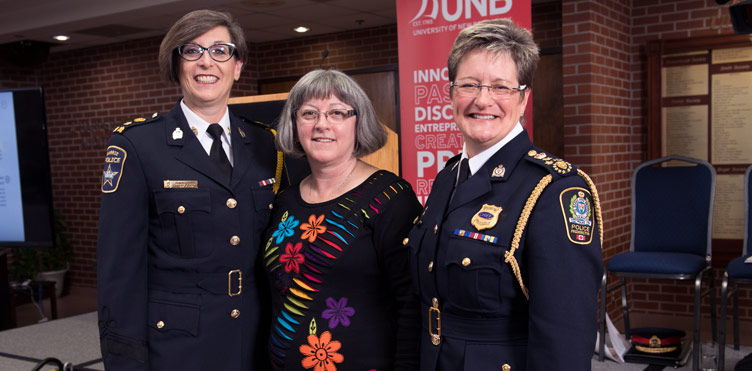
Family violence accounts for more than a quarter of all police-reported violent crime in Canada – a significant, yet seldom discussed issue.
The Canadian Association of Chiefs of Police (CACP) has released a national framework addressing this staggering statistic and promoting preventative measures. The framework is an effort to raise awareness and create a shared understanding and common terminology for police agencies and community stakeholders from coast to coast.
Integral to this initiative were UNB alumna and Fredericton Police Chief Leanne Fitch (BA’85, MA’95) and Carmen Gill, leader of the Canadian Observatory on the Justice System’s Response to Intimate Partner Violence at UNB and professor of sociology at UNB.
“I think, more and more, academics are working in partnership or in collaboration with people from different milieus,” says Gill. “You cannot conduct research without working in collaboration.
In 2005-06, the observatory collaborated with the Fredericton Police Department to develop a training manual for police officers intervening in cases of intimate partner violence.
“One of the reasons that this was identified as an issue back then was that realistically, our officers respond to domestic violence calls or domestic dispute calls every single day in Fredericton,” says Fitch. “We average over 500 calls for service per year.”
Recently, Gill approached Fitch to take their work to the next level. They organized a think tank, comprised of police officers, academics and key stakeholders from across the country, to discuss how intimate partner violence is approached in each of their communities. This process reaffirmed the need for a common understanding of this issue at a national level.
“These issues aren’t unique to any one community,” says Chief Fitch. “Certainly, not unique to any one profession or class or race or religion. It’s very far reaching and we recognize that this is a national issue.”
The price tag associated with intimate partner violence nationally is in the billions, says Fitch. Those are just the cases that are reported.
“We know that intimate partner violence and domestic violence, family violence – under all of those names – is not just a police issue,” says Chief Fitch. “It’s a societal issue and it really requires a whole community web of support for victims, abusers and their families.”
Fitch and Gill brought together a diverse group of experts, ranging from police officers to provincial policy makers and community-based organizations who deal with victims or abusers and academic experts specializing in areas related to the issue.
That’s really the essence of contemporary community policing, says Fitch, the opportunity to work with other community stakeholders and citizens to come up with the best solutions to very complex issues. With a master’s thesis on community policing and organizational change, it seems her work has come full circle.
This project was entirely funded by a grant from the Social Sciences and Humanities Research Council through the Canadian Observatory, received by Gill who firmly believes in the importance of using her research to give back to the community.
The CACP Crime Prevention, Community Safety and Well-being Committee, co-chaired by Fitch and Chief Kimberly Greenwood of the Barrie Police Department was also an essential partner in the development of the framework.
Over time, Fitch and Gill hope to see the impact of the national framework and the preventative work being done across the country – a very important piece of the puzzle.
“It’s something we all have a stake in, helping to keep our people safe,” says Fitch.